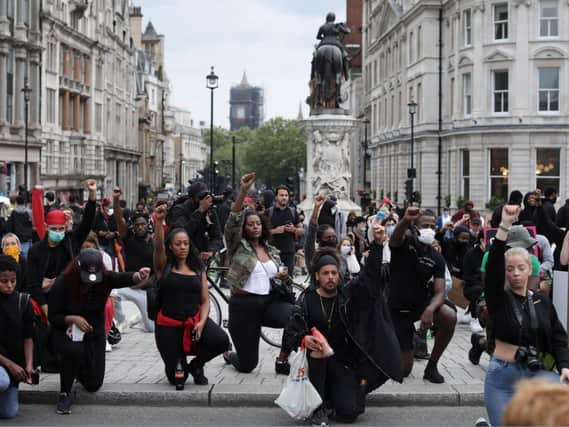Rachel McGrath column: Why everyone needs to support Black Lives Matter


We all need to support Black Lives Matter.
In the summer of Covid-19 we have seen the emergence of a new civil rights movement in the wake of the murder of George Floyd by police brutality in the USA.
Mostly peaceful demonstrations have taken place, including a large turnout of responsible Northampton protesters who were thanked by police for their peaceful procession and adhering to social distancing.
Advertisement
Hide AdAdvertisement
Hide AdOne of the organisers, Anjona Roy, director of Northamptonshire Rights and Equality Council, said: “On Tuesday, June 3, at 6pm Stand Up to Racism Northampton and Northamptonshire Rights and Equality Council hosted a demonstration to express concern, anguish and subsequent solidarity with George Floyd’s family after his murder at the hands of police officers in Minneapolis, USA.
“Those that came to peacefully protest, came to highlight racism and race discrimination that has blighted the lives of so many people locally.
“The aim was to loudly and clearly express that racism needs to be seen, heard, called out and stopped.”
In terms of the Black Lives Matter movement we need to remember the three women who kick started it. Their names are Alicia Garza, Patrisse Cullors and Opal Tomeli.
Advertisement
Hide AdAdvertisement
Hide AdIt came about when one George Zimmerman was acquitted of the murder of 17-year-old Trayvon Martin in Florida, USA. Alice Garza, one of the founders, has famously stated about the movement the following: “There is hope for humanity, but in order for us to get there, we really have to interrogate not just what it takes to change laws, but what it takes to change culture that supports laws that uplift humanity and also supports laws that serve to denigrate it.”
The most recently recorded act of civil disobedience as part of the wave of protests across the UK has been the removal of the statue of slave trader Edward Colston into the Bristol Channel.
Public sculpture expert Professor Claudine Van Hensbergen of Northumbria University observed the following in a recent article: “In the majority of cases, public sculpture is commissioned and made for political reasons. It is natural, then, that it should invite political response.”
The reality is that local residents had been campaigning for years to have it taken down and there should have been a more timely intervention by the local council.
Advertisement
Hide AdAdvertisement
Hide AdIndeed, as Professor Claudine Van Hensbergen highlights, this act is nothing new.
It harks back to a tradition in Rome known as ‘the tradition of Pasquin’ where residents in the 16th century would attach notes to the damaged statue of Pasquino highlighting their criticisms of the corrupt actions of state and church.
There is a plaque in the local Bristol Bus Station to commemorate the campaigners of the 1963 Bristol Bus Boycott which successfully overturned the racist policy of the Bristol Omnibus Company that prevented black people from working as bus drivers.
The Race Relations Act became legislation on November 8, 1965, in the UK and it outlawed racial discrimination in public places and made the promotion of hatred on the grounds of ‘colour, race, or ethnic or national origins’ an offence.
Our health experts are working to find a vaccination for Covid-19, but the virus of racism needs to be tackled by all of us.